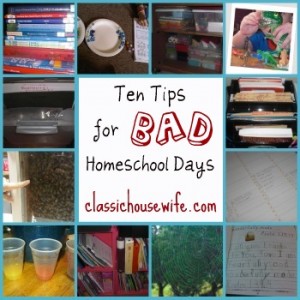Welcome back as we continue our 10 Days of Terrible, Horrible, No Good, Very Bad Homeschooling!

Let’s move on from History and talk about some SCIENCE, shall we?? Today I’d like you to meet Heidi from Torah Family Living who shares how she is overcoming her “science experiment hangup.”
~~
I’m a homeschool graduate with six kiddos. I’m used to juggling. I teach reading, writing, math, history to four children while nursing and quieting the barking toddler under the table.
But I have a nemesis.
Science experiments.
Somehow, the thought of doing experiments at my kitchen counter with excited loud grabby children, well, just makes me want to avoid it. This is odd, because, as a general rule, I love science. I’m fascinated by the amazing creation around us. Our Father gave us a beautiful world to live in. I want my children to appreciate and understand scientific principles. So how do I overcome this fear of science experiments? I’m a work in progress, but I have learned a few things.
Think outside the box
Sometimes we run into problems in homeschooling because we assume things. I assume that science must include experiments. But if I broaden my thinking a bit, I suddenly realize how much my children know about science, even though I could count on my fingers how many times I’ve done official science experiments with them.
- My daughter brought in a shedded exoskeleton from a cicada. Wow!
- My children understand the purpose of the ingredients we bake with. (yeast = puffy bread, etc.)
- We sort animals into groups like mammal, reptile, fish; or oviparous and nonoviparous.
- We garden and grow sprouts in the house to eat.
- We draw pictures of animals and bugs that we find in the field guide.
- My kids love to build forts in the pasture with sticks and baling twine.
- We watch the weather to see if Daddy will be able to land at the airport safely each morning. (He’s a pilot.)
- We watch the moon cycle to help us calculate the Biblical feast days.
- We butcher sheep as a family, and discuss the purpose of various organs.
- My children have helped raised baby lambs that got rejected by their mother, and are completely in charge of the chickens.
Sounds to me like they have a pretty decent handle on zoology, botany, meteorology, chemistry, physics, anatomy and astronomy.
Science is part of everyday life for us. Before freaking out about what I lack, it has been important for me to see just how much they have learned “by accident.” I have started keeping a rough list of what my children do, how they play, what they understand. Most of this list is in my head, and simply helps me to be aware of the knowledge that my children have soaked up.
I’m feeling better already!
Be Prepared
But I still want more. I want to know that I have systematically prepared my children for whatever YHVH may have for them. Science also helps children develop skills like observation, analytical thinking, problem solving. How can I give my children a quality science education that (Oh my goodness) includes experiments?
- Preparation is a key. I’ll never do an experiment with my children if I can’t see my kitchen counter. I need to keep my surroundings orderly. I need to keep up on daily chores, so we can just do an experiment, without having to find a surface first.
- Let Daddy do some experiments. My husband has a keen knowledge of physics, meteorology, and astronomy. He sometimes does activities with the kids, like kite flying, small fireworks, star gazing, and other cool Daddy stuff.
- Keep things small and simple. We don’t need to mix chemicals in the third grade. That can wait until high school, and is really only necessary if there is student interest. Letting the kids help with baking is probably sufficient for chemistry and physics experiments can be done with toy cars, blocks and balls. (That’s not so scary, is it?)
- Find a curriculum you’re happy with. I think I may have finally found a curriculum that thinks like I do, or at least close. This curriculum does not include tests, but rather emphasizes student feedback. The projects are simple and do-able, even for me. The projects we have done so far have been enjoyed by the kids, and expanded their understanding of scientific concepts. And it’s free!
Don’t underestimate nature study
An intimate understanding of the world at my feet is invaluable. Learning about polar bears and volcanoes is fascinating and cool. But knowing which plants in my yard are edible or medicinal is far more valuable. Practicing animal care not only provides food for our family, but promotes compassion and responsibility. Following the seasons and the weather outside my door protects me, and helps me prepare for the future. Watching and listening to the birds in the trees brings enjoyment and relaxation. The flowers and robins and grasshoppers become my friends. As a child, I walked the yard with my Dad, inspecting the little trees he had planted. I learned about how trees grow and change. I learned the names of the wildflowers. I learned about how the killdeer protects its nest by acting injured. Now, as I walk the yard with my own children, I share with them the sound of the loon, the taste of a clover flower, the habits of the squirrels hopping from tree to tree. I need to wake up and realize that this is science at its best. This is meaningful science. This is science that happens accidentally, without anyone noticing.
Just lighten up and enjoy it
Have you ever put off a cleaning job, thinking it would take forever, and when you finally did it, it was done in five minutes?
I think that’s what happens with me and science experiments. I think it’s going to be some major deal, scary, messy, noisy, crazy. But when I actually take the time to do a project with my children, we have a great time, and they are begging for more. When it comes right down to the bottom line, I need to just lighten up. I need to put aside the serious jobs, the internet time, turn off the TV, and just enjoy my children. I know that science doesn’t have to be difficult, but I need to take that final step and just get my feet wet. I might even get my hands dirty. But it’ll be fun! My kids will love it! Isn’t that enough reason to step out of my comfort zone? I think so.
Heidi is a homeschool mom of six children. She spends her days milking goats, changing diapers, reading aloud, and baking yummy goodies. Recently she has begun a journey learning about Asperger’s syndrome to help her daughter and husband. You can read more at her website www.torahfamilyliving.com, where she blogs about how Scripture, particularly the Torah, should permeate all of our lives. She can also be found on facebook.
~~
Do you have a science experiment hang-up? Or are you a science experiment junkie? How do you make science come alive at your house?
 Thank you for following along on our journey through 10 Days of Terrible, Horrible, No Good, Very Bad Homeschooling!
Thank you for following along on our journey through 10 Days of Terrible, Horrible, No Good, Very Bad Homeschooling!
If you’re just now joining in, you can start at the beginning by clicking here.
“The 10 Days” Series is organized by iHomeschool Network, a collaboration of outstanding homeschool bloggers who connect with each other and with family-friendly companies in mutually beneficial projects. Visit them on Facebook, Pinterest, and Twitter.
To find ALL the blogs participating in this run of “The 10 Days” Series, click the image below, a collage of photos for all 28 ladies participating. You’ll be blessed with tips on how to handle bad days, cultivating curiosity, teaching with Legos, and much, much more. Many thanks to iHomeschool Network for organizing this fun blog hop!




[…] excited to share a post about hands on science. But you will have the privilege of heading over to http://www.classichousewife.com where I guest posted for her 2 week […]
Ah science. I too have a nemesis of science experiments. And yet we enjoy them so much that I WANT to do them more often…but don’t. My son ASKS for them, so I want to give it to him…but I always give *excuses*. Thankfully living on the farm allows for a LOT of free science. We have learned about wildflowers. How things grow. Why things grow better in some places of our yard than others. We’ve been identifying birds. Watching our cat hunt and talk about why he does what he does. My son also takes great joy in the… Read more »
How much do I love that you showed him the skeleton before throwing it out. <3
My son would have been ecstatic. They recently found a scull while walking on my mom's property and brought it home in a bag to identify. We looked it up and decided it was either a raccoon or a fox - I can't remember now! =p
Thank you SO MUCH, Heidi!! I think we could have written identical posts about this (well.. except for the sheep butchering part!) =) I cringe when I think about big hands-on projects and all the grabby hands running in and grabbing things out of turn and skipping steps and making messes. Sometimes it feels like a fast-paced game of ping pong ball!! (The same goes for trying to bake/cook with all 3 kids at once – a rare occasion!) But like you, we experience SO MUCH science through daily life. It’s there if you just LOOK for it. We have… Read more »
Thanks, Amber!
I just discovered a little trick tonight to avoid the 6 kids around the counter scenario! Divide and Conquer! I had a lot of baking to do, so I let each child pick one thing to help me with. When it was their turn, they were the only one allowed in the kitchen. It went really well, and I was able to take the time for things like my four year old counting the eggs as we put them in. Could this work for science stuff too? Hmmm….
We are definitely hands-on science experiment junkies! Science doesn’t have to be a nemesis – have you checked out our free experiment library with easy to do science? We’d love to have you try one of our experiments and let us know if it lightens your science hangup. How about Diving Ketchup Packets http://www.stevespanglerscience.com/experiment/cartesian-diver-ketchup
Or Color Changing Milk http://www.stevespanglerscience.com/experiment/milk-color-explosion
It doesn’t have to be elaborate to inspire learning and discovery. Good luck with your science lessons!
Thank you, Susan! I’ve been the Steve Spangler site before.. it’s very cool! My kids would love to try these. Yesterday we played with corn starch. I bet the science site has a the corn starch experiment “recipe” I’m looking for — I’m off to go find out!
This post was written for me. Thank you! We are just beginning our homeschooling journey and I dread Science experiments. Pinterest intimidates me in the homeschool Science department. Also, as you stated having other grabby, small hands around don’t help. Thanks again for calming some of my fears!